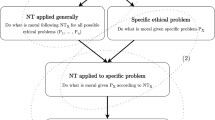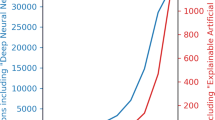Abstract
In this paper, I explore the implications of Fodor’s attacks on the Computational Theory of Mind (CTM), which get their most recent airing in The Mind Doesn’t Work That Way. I argue that if Fodor is right that the CTM founders on the global nature of abductive inference, then several of the philosophical views about the mind that he has championed over the years founder as well. I focus on Fodor’s accounts of mental causation, psychological explanation, and intentionality.
Similar content being viewed by others
References
T. Burge (1979) Individualism and the Mental P. French T. Euling H. Wettstein (Eds) Midwest Studies in Philosophy lV University of Minnesota Press Minneapolis, Minn. 73–121
T. Burge (1986) ArticleTitleIntellectual Norms and Foundations of Mind Journal of Philosophy 83 697–720
T. Burge (1989) Wherein is Language Social? A. George (Eds) Reflections on Chomsky Blackwell Oxford 175–191
J. Fodor (1974) ArticleTitleSpecial Sciences Synthese 28 77–115 Occurrence Handle10.1007/BF00485230
J. Fodor (1975) The Language of Thought Crowell New York
J. Fodor (1983) The Modularity of Mind MIT Press Cambridge, Mass
J. Fodor (1987) Psychosemantics: The Problem of Meaning in the Philosophy of Mind MIT Press Cambridge, Mass.
J. Fodor (1989) ArticleTitleMaking Mind Matter More Philosophical Topics 17 59–79.
J. Fodor (1990) A Theory of Content and Other Essays MIT Press Cambridge, Mass
J. Fodor (1991) ArticleTitleYou Can Fool Some of the People All of the Time, Everything Else Being Equal; Hedged Laws and Psychological Explanations Mind 100 19–34
J. Fodor (1994) The Elm and the Expert MIT Press Cambridge, Mass
J. Fodor (1997) Special Sciences: Still Autonomous after All These Years (A Reply to Jaegwon Kim’s ‘Multiple Realization and the Metaphysics of Reduction’) J. Tomberlin (Eds) Philosophical Perspectives 11: Mind, Causation, and World Blackwell Oxford 149–163.
J. Fodor (1998a) Concepts: Where Cognitive Science Went Wrong Oxford University Press Oxford
J. Fodor (1998b) In Critical Condition: Polemical Essays on Cognitive Science and the Philosophy of Mind MIT Press Cambridge, Mass
J. Fodor (2000) The Mind Doesn’t Work That Way: The Scope and Limits of Computational Psychology MIT Press Cambridge, Mass
J. Fodor E. Lepore (1992) Holism: A Shopper’s Guide Oxford Blackwell
J. Kim (1992) ArticleTitleMultiple Realization and the Metaphysics of Reduction Philosophy and Phenomenological Research 53 1–26
G. Rey (1997) Contemporary Philosophy of Mind: A Contentiously Classical Approach Blackwell Oxford
Author information
Authors and Affiliations
Corresponding author
Rights and permissions
About this article
Cite this article
Hershfield, J. Is There Life After the Death of the Computational Theory of Mind?. Mind Mach 15, 183–194 (2005). https://doi.org/10.1007/s11023-005-2003-3
Issue Date:
DOI: https://doi.org/10.1007/s11023-005-2003-3




